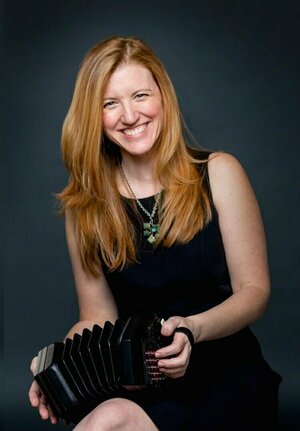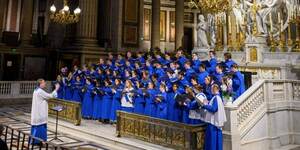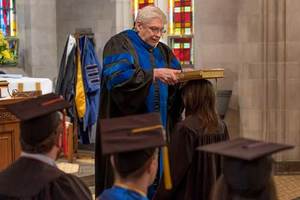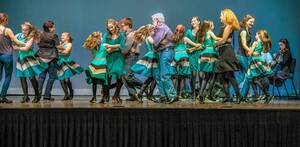Alumni Spotlight: Shannon Dunne (B.A. '98)

The Medieval Institute is pleased to present our Fall 2023 Alumni Spotlight. In this series we feature the career paths of institute alumni. Look for a new installment each semester, and follow our weekly news features regarding Medieval Institute-supported programming, events, guest lectures and general medievalist news on our news and events feed.
This semester’s alumni spotlight features Shannon Dunne, who graduated from Notre Dame in 1998 with a B.A. in History with a concentration in Medieval Studies. After graduation, Dunne spent time in rural Ireland studying traditional Irish music and dance and has since become a renowned Irish dancer and teacher.
As a performer, Dunne has traveled throughout the U.S. and world, and her work has been honored by many organizations such as the D.C. Commission on the Arts and Humanities and the National Endowment for the Arts. As a teacher, Dunne runs her own Irish dance studio and children’s dance camp (Camp Shenanigans), and she has collaborated with many organizations to bring traditional Irish dance and music to the community. Most recently, Dunne has partnered with Notre Dame to offer Irish dance classes to Notre Dame students, as well as to incarcerated students earning degrees from Holy Cross.
We asked Dunne to share more about her time at the Medieval Institute and the ways it prepared her for her creative career.
What initially sparked your interest in Medieval Studies?

From a very young age, I loved the way the medieval period of history has all of these fantastic structures that attempt to harness the complete chaos of life at that time. I recognized that there were aspects of medieval order that had been carried into modern society, though they seemed to be invisible to most people. The medieval period was disregarded as ancient history by many people, but, to me, those were always the people that likely hadn't progressed far beyond it.
When I got to Notre Dame, the connections to medieval history seemed even more at the forefront. Singing in the Liturgical Choir and touring Italy freshman year fanned the flames.
Sometime mid-sophomore year I noticed that all of my history classes and electives were cross listed with Medieval Studies. It was a feeling of relief. I likely would have majored in Medieval Studies, but I did not have room (or any prior experience) with Latin. So I stuck with the concentration, and just took as many classes as I could manage from MI.
Did you develop a favorite area within medieval studies?
If you asked me then, I would say "Art History," but now I understand that my study was geared toward exploring the way art was used as a tool for spiritual practice, prayer, and reflection. Art was active, not passive. I was particularly obsessed with the role of art within monasteries.
My senior thesis compared the art in a Dominican versus a Franciscan monastery, with the former being centered around instructional art for combining reflection with the physical positioning of the audience, similar to a traditional yoga practice.
The Medieval Institute has so much to offer anyone with an interest. This is a unique place, and you'd be wise to take as much in while you can. Don't feel that you need to have a reason to look through the stacks, talk to professors, or look at the art. You won't know what is there for you until you start asking questions.
What is one of your best memories of your time at the institute?
My senior year I was able to take some graduate level art history classes, and that was truly inspiring. No other nonsense. No one cared about what you did last night, or what you were wearing. It was so focused. I felt like every day I was looking at slides of art that would fold out into four dimensions over the course of the hour. I can remember all the details of that room.

Maura Nolan's class, "The Art of Courtly Love in the Middle Ages," was a big highlight. She had an extraordinary gift for setting the stage for the texts so that they felt current, and yet also historical. I have been carrying around Andreas Cappellanus and Marie de France ever since. Plus, she entertained our endless reenactments of Monty Python and the Holy Grail, in all of our undergrad glory. I'm sure we were absolutely insufferable! But she embraced it and used it as a tool to bring us in even deeper. Genius.
And of course, the Medieval Institute graduation is the best graduation on campus, bar none.
How has your study of the Middle Ages impacted your career since graduating? What are you working on now?

In my mid-20s I began studying traditional Irish music and dance, almost accidentally, in rural Ireland. Given that the internet was relatively new, and not yet in remote places, I relied heavily on my ability to research and look at all aspects of a culture in order to truly understand it.
I have been doing field study and pedagogy experimentation for 20+ years in this field. I am proud to say that I have had some All Ireland Medalists come from my school, and now I am teaching those styles here at Notre Dame, through the Department of Irish Literature and Language.
Tell us more about your involvement with Westville.
In Fall of 2022, I proposed, devised, and taught a three-credit Irish music class at the Westville Correctional Facility, through the Moreau College Initiative (MCI). The Moreau College Initiative (MCI) is an academic collaboration between Holy Cross College and the University of Notre Dame, in partnership with the Indiana Department of Correction. College students incarcerated at Westville Correctional Facility earn credits towards a Holy Cross College Associate of Arts (AA) degree or Bachelor of Arts (BA) degree.
The class used the tin whistle as a means to study basic music theory, Irish culture, and Irish music performance. This was the first time a music class had been permitted at MCI. At the end of the term, the students wanted to continue, and so I volunteered my time in the second semester to act as the faculty advisor and host of an Irish music club. The club met once a week for three hours.
Once a student was able to play three tunes on the whistle and two scales, they were allowed to try another instrument. If a student was able to transfer their tunes onto the new instrument, I would source an instrument for them to ensure they were able to practice.
Thanks to donations of instruments from the ND/SMC/HCC and the South Bend community, we now have three fiddle players, four banjo players, multiple whistle players, a concertina player, and two percussionists. John Kennedy, of the local Irish music band "Kennedy's Kitchen," has come in to help me support the group during the summer and fall, and in the spring I will offer both a 100-level and a 200-level class.
Do you have advice for current majors and/or minors, or those considering medieval studies, about why they should pursue medieval studies?
My advice for all students is this: explore the resources available to you. The Medieval Institute has so much to offer anyone with an interest. This is a unique place, and you'd be wise to take as much in while you can. Don't feel that you need to have a reason to look through the stacks, talk to professors, or look at the art. You won't know what is there for you until you start asking questions.
For majors/minors, I would say to pay close attention to what lights you up. I had tremendous academic experiences when I stopped feeling like I needed to study this or that.
I would also add that you do not have to major/minor to be associated to explore the Institute and what it has to offer. My situation is a perfect example of that.
This interview has been edited lightly for length and clarity.